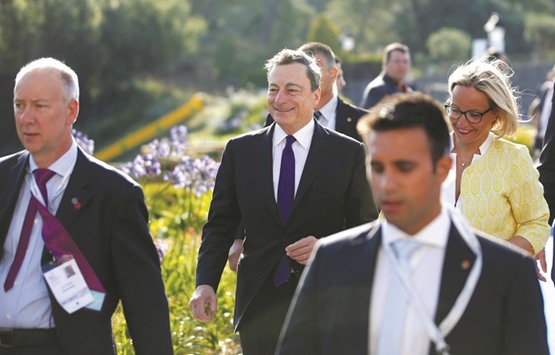Mario Draghi took an unusual tack among the world’s major policy makers — giving a speech that had no explicit reference to the UK’s decision to quit the European Union.
While investors are keen to hear what the European Central Bank president is doing to contain the fallout from Brexit, he decided to use his opening address at the ECB Forum in Sintra, Portugal, to call for global policy alignment. Acknowledging that ultra-loose monetary policies have “inevitably” created potentially destabilising spillover effects, he said there is a “common responsibility” to address the world’s economic weaknesses.
“We can benefit from alignment of policies,” Draghi said yesterday. “What I mean by alignment is a shared diagnosis of the root causes of the challenges that affect us all; and a shared commitment to found our domestic policies on that diagnosis.”
Central banks’ extraordinary measures to boost inflation since the global financial crisis have depressed interest rates, stoking discontent among savers and drawing accusations that they have boosted support for populist parties.
The latest and most disruptive sign of popular discontent was the UK referendum, which saw voters opt to leave the EU. The pound crashed to a three-decade low, global financial markets have been thrown into tumult, and bets that the Bank of England and ECB will cut interest rates have increased.
Draghi said in welcoming remarks at a dinner on Monday that the best word to describe his sentiment in reaction to the British referendum was probably “sadness,” and chose to say no more the next day. He was to travel to Brussels for a meeting with EU leaders later yesterday.
The ECB has previously pledged to provide liquidity to banks, if needed, to ensure financial stability after Brexit.
Draghi’s message in Sintra can be seen as a follow-on from speeches in Vienna on June 2, when he insisted the central bank will do what it must to meet its inflation mandate as quickly as possible, and in Brussels a week later when he urged that national government policies must be aligned with monetary policy.
“What I am saying here is that the same applies at the global level,” he said at the forum. “With internationally mobile capital, the clearing interest rate that balances saving and investment is more a global concept than a local one.”
The ECB Forum, a European equivalent of the US Federal Reserve’s Jackson Hole symposium, runs through today. Executive Board members Benoit Coeure and Peter Praet are chairing panel discussions on Tuesday, with Sabine Lautenschlaeger and Vitor Constancio scheduled for the following day.
A debate with BOE Governor Mark Carney and US Federal Reserve Chair Janet Yellen that was planned at the end of the event was cancelled so Draghi could go to the EU meeting in Brussels, the ECB said in a statement on Monday.
The ECB Forum’s title is “The future of the international monetary and financial architecture,” and speakers are showing that while Brexit may be on their minds, they intend to address that bigger picture.
University of California economics professor Barry Eichengreen presented a paper on global monetary order before the discussion moved on to topics including real interest rates, imbalances and the curse of regional safe asset providers at the zero lower bound. “The upshot is that, in a globalised world, the global policy mix matters — and will likely matter more as our economies become more integrated,” Draghi said. “This is not a preference or a choice. It is simply the new reality we face.”

ECB president Mario Draghi (centre) arrives at the ECB Forum in Sintra, Portugal, yesterday. Acknowledging that ultra-loose monetary policies have u201cinevitablyu201d created potentially destabilising spillover effects, Draghi said there is a u201ccommon responsibilityu201d to address the world’s economic weaknesses.
